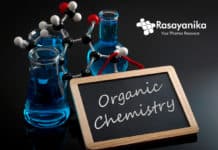The field of chemistry is broad and touches on all aspects of life. Chemists are employed by private industries, as virtually every product that is manufactured and sold in the United States involves chemistry. The government hires chemists in national laboratories as well as agencies like the FBI, FDA and EPA. Chemists are engaged in sales and tech support and are at all levels of academia. If you are thinking of a career in chemical sales, consider the possibilities – there are many.
Agrochemist
Chemists who work in the agricultural field study the chemistry of food for plants, livestock and humans. They examine chemicals used to increase crop yields as well as herbicides, pesticides and insecticides. They find jobs with different levels of government as well as food-producing companies.
Biochemist
Biochemistry is a mix of biology with organic, inorganic and physical chemistry. Studying the chemistry of all living things, biochemists find work in the fields of medicine, dentistry and veterinary medicine.
Geochemist
Geochemists study the chemistry of minerals and rocks. They find careers with energy companies, investigating the impact of mining and drilling on the environment. Others engage in research with hazardous materials disposal.
Inorganic Chemist
Inorganic chemists find employment
in diverse areas ranging from mining to microchip manufacture. They may work with coatings and paint, examining the chemical composition of mined ore or waste materials in the soil. Employers range from the high tech industries to paint manufacturers to energy companies and more.Forensic Chemist
Forensic chemists study crime scene evidence — hair, fabric, paint and blood. Forensic chemists may not appear on television dramas, but they do have to present evidence with court appearances. DNA analysis has opened even more opportunities for forensic chemists.
Environmental Chemist
Environmental chemists study the effects of humans on the environment. They examine chemicals like the pollutants not caught by water treatment plants or industrial chimney filters. Environmental chemists help companies comply with hazardous material regulations. They find employment with many manufacturing companies.
Physical Chemist
The work of physical chemists crosses all branches of chemistry; they look at chemical reactions on the atomic and molecular levels. Nanoscience benefits from the work of physical chemists. They are even involved in environmental science — for example, studying the impact of ozone in the upper atmosphere.
Organic Chemist
Organic chemistry is the study of carbon-based compounds, and the field extends well beyond what most would assume. There are organic compounds in rubber, medicine, fuel and cosmetics. Pharmaceuticals offer opportunities for organic chemists to synthesize molecular structures in order to combat a variety of human illnesses and medical conditions.
Chemical Salesperson
For those who do not wish to work in a lab, the sales industry offers an attractive alternative. Whether the sale involves selling raw commodities to a chemical manufacturer or selling a refined chemical to an end-user, having a solid background in chemistry gives a sales rep a leg up on the competition. Opportunities for salespeople are everywhere.
Educator
From the high school classroom to the community college to the university, a chemistry degree can land a teaching position. Teaching at the university level requires a PhD and provides the opportunity to engage in research in addition to teaching.




















































